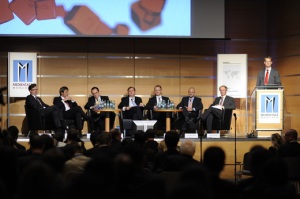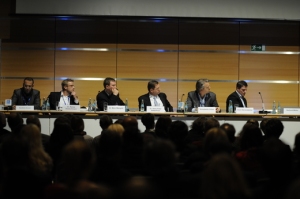
Just back from Day 1 of the Medientage 2008 here in Munich
There is no chance to blog a conference like that in detail without going crazy, so just some things I have learnt… in bullet points, sorry.
(Update: I have added links to videos of the panels I´m talking about. Most of them are in German, sorry.)

Panel: Customer Relationship instead of Ratings – New Driving Force in TV?
Intro speech by Niko Steinkrauß, Booz & Company:
– Three megatrends influence and accelerate each other: -> fragmentation of the media market -> advertiser under pressure -> power moves to the consumer
– Examples like P&G, Coke, Nike show that “direct customer relationships” are getting more and more important for the big media spenders.
– Only interactive and “target able” advertising platforms show growth.
– There is a rethinking in campaign controlling: Reach is not the only “thing” anymore. Performance, ROI and “interactivity” are getting more important.
– High CPMs for interactivity: Opportunities for TV 2.0?
– Let the user decide how they want to consume advertising (eg. preroll “block”? banner? ad breaks –> higher engagement –> higher advertising impact)
– Best case: Hulu
– Concerns about privacy vs. willingness to get relevant advertising –> more clarification
– Recommendations: Be a brand not a aggregator of viewers – there is more than just one platform – don´t just offer adinventory, offer solutions – cooperations between TV channels are necessary to establish new standards eg. web tv (Hulu) – overcome being just a wholesaler of adinventory and try to establish communities and capitalize customer relationships
Panel discussion:
Berg: A current Microsoft study shows that the “under 20 generation” has no interest in television anymore. They don`t arrange their spare time around TV programme anymore.
Senft: There is no cannibalization. TV and Online complement each other.
Züll: Definition of TV? Linear or non linear? TV signal or IP protocol? TV content still works. Hulu uses TV content but non linear.
Fassnacht: The user is most of the time in the new online environment overextended. Content overflow. This leads to less users. Comparsion: Product line management in the retail industry: Smaller range of products leads to more sales.
Berg: Trend – I don´t care about ratings. I want performance, I want response.
Züll: Internet usage will consolidate and focus. Every user has small relevant set of websites he visits regularly.
Guild: It´s more important nowadays what users say about brands that what brands say about themselves. The big challenge for the media: How do we play a role in the connection of client brands with the consumer conversations.
Fastnacht: Only get in contact with a consumer when he wants to. Only then!
Künstner: The learning curve in CRM in the new environment is big. A huge chance for media companies.
Berg: The transformation process from “classic TV” to “TV in the digital age” in the next 3-5 years is crucial.
Künstner: Who will design the best customer experience? Probably not one of the “old players” (See music industry and Apple).

Panel: Media, Power & Brand: Business Models and Brand Values in the Digital World
Gerhard Müller presents some insights of the new Ernst & Young study (only German) “Medien und Marken im Web 2.0”
Evsan: User generated content has to be combined with premium content. Premium content was always and will be very important in the future.
Dörrenbächer: Case: “A small world” – Exclusive niche community –> very valuable for Mercedes.
Mangold: Communication concepts and cross media solutions are very important. Display ads are not enough. Performance based marketing rules. There will be a evolution from “reach” to “risk & revenue share” business models.
Dörrenbächer: Which role will digital media play in the value chain? Standards for “measurement” are still missing. Behavioral targeting is not far enough…
Deutschmann: The “used” targeting parameters are still very simple. Basic demography targeting is still standard. Media agencies and clients aren`t able to use all the data they can get… many niches are to small to target…
A great first day.
